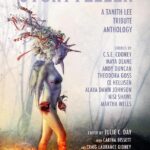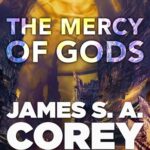
Genres: Queer Protagonists
Representation: Black bi mc, Puerto Rican American sapphic mc, biracial bi ace trans mc, nonbinary side character, Black bi side character, Black side characters
Published on: 7th September 2021
Goodreads

One October morning, Laina gets the news that her brother was shot and killed by Boston cops. But what looks like a case of police brutality soon reveals something much stranger. Monsters are real. And they want everyone to know it.
As creatures from myth and legend come out of the shadows, seeking safety through visibility, their emergence sets off a chain of seemingly unrelated events. Members of a local werewolf pack are threatened into silence. A professor follows a missing friend’s trail of bread crumbs to a mysterious secret society. And a young boy with unique abilities seeks refuge in a pro-monster organization with secrets of its own. Meanwhile, more people start disappearing, suicides and hate crimes increase, and protests erupt globally, both for and against the monsters.
At the center is a mystery no one thinks to ask: Why now? What has frightened the monsters out of the dark?
The world will soon find out.
I received this book for free from the publisher via NetGalley in exchange for an honest review. This does not affect my opinion of the book or the content of my review.
Highlights
~the conspiracy theorists are right (maybe)
~tech magic
~‘I have never answered that question’
~a loving open relationship
~Dragon
~anarchists have the best bookshops
~skins are sometimes optional
I read this in two sittings, and it would have been one if I didn’t have to sleep. I pushed through the first few pages, which seemed to have nothing to do with the story promised by the blurb…and then I was completely hooked. No Gods, No Monsters was a book I resented having to put down, and I expect a lot of other people are going to feel the same way when they get it in their hands.
It’s not quite like anything I’ve ever read before.
Part of that is the structure: the book is divided into multiple parts, all of which are quite short, each of which is from the perspective of a different character. As the book goes on, the connections between these characters become clearer – several of them know each other – but here’s the thing: the first part, the opening that I found so confusing? That’s written in first-person. The rest are in third.
That’s not the weird thing.
The weird thing is that the first part, the first-person part, is pretty banal. It doesn’t seem to have anything to do with anything. It’s only when we get to the second part, Laina’s part, that what seems like the story gets moving.
Laina’s brother has been shot and killed by the police. Turnbull sketches out the devastating grief, the disorientation and numbness and rage that come in the aftermath, with brutal precision. The prose is bare of ornamentation, almost bluntly so, until a shift in perspective – the perfect word, a poignant line – makes it clear that Turnbell writes as if wielding a scalpel in a surgery; precise, economical, and cutting through the meat right into the core. It’s a style that hooks you in and doesn’t let you go again, which is perfect for so many reasons, but most of all because that’s exactly what’s happening to the characters – they’re all being hooked in, dragged in, and not let go again.
Here and there within Laina’s part of the book – which is written in third-person, remember – is an occasional ‘I’ sentence. A line or two in first-person, in a voice that is clearly not Laina’s. There is no explanation for this. I was scribbling notes as I read, and surrounded in question marks were my theories invisible friend??? split personality??? something supernatural following her around???
Then Laina is approached by a voice. Not in her head, but somewhere in her dark bedroom. The voice asks if Laina wants the body-cam footage of her brother’s killing. Laina decides that she does. The voice promises to have it delivered to her.
And then the first-person occasional-narrator voice reaches out to the Other Voice. Still in Laina’s part of the book, but separate from Laina, outside of her.
It is here that I stop time. The world around us slows, all matter falls still, and all sound stops. There is only the voice and me. I reach out to the formless thing, trying to access its mind but finding nothing. In all my time traveling the fractal sea, this has never happened. Minds are always open to me.
“What are you?” I ask directly. “What is this?”For a terrible moment, the voice doesn’t answer, and for the first time, I feel a sense of danger I’ve never thought to feel.
“I’ve signed a contract,” it finally says. “I am bound not to speak to you.”
“By whom?”
“The universe,” it says.
And the voice answers no more of my questions.
What. The. Hell.
The body-cam footage appears, mysteriously. As you’ve probably worked out from the blurb, it reveals that Laina’s estranged brother was a werewolf.
Werewolves are a thing now.
But of course, it’s not nearly that simple. Even after a pack of werewolves ‘come out of the broom closet’, people are quick to call it a hoax. Nobody publicly announces that they now believe in the supernatural…but the event sends quiet shockwaves through society anyway. People start being attacked, even killed, for being suspected witches or werewolves or anything else hateful people can dream up. We follow another character as he goes down the rabbit hole of conspiracy theories and secret societies…which ends nowhere good.
That’s actually where some of the pieces…not come together, but maybe start hinting that they might, possibly, at some undetermined time in the future, come together. We get glimpses of different factions, different groups of supernatural creatures (who call themselves ‘monsters’ in a way that’s very reminiscent – probably deliberately – of people calling themselves/using the label of queer). There’s a suggestion that some of these groups have agendas, but the problem – I think the biggest problem with this book – is that we don’t really have a clue what those agendas are.
Here’s the thing: Turnbull has great characters, great prose, and what looks like some seriously unique and interesting worldbuilding. The problem is that No Gods, No Monsters feels like the first half of the first book in a series, rather than a whole book in and of itself. Of course not all of our questions were going to be answered in book one – that’s a given. But NGNM leaves you feeling like you don’t even know all the questions yet. The plot, if there is one, is barely hinted at, sketched out so lightly that even if you squint, you can’t make out its shape. In some ways, that makes it feel more real – real life doesn’t have a neat plot that builds to an arc-ending climax before we start the next book arc, so maybe it doesn’t make sense to write fiction that way, especially when you want it to feel more like life than fiction.
On the other hand, even if that was Turnbull’s intent, I think it’s taken a bit too far. I don’t mind a looser plot, but I finished this book and realised I had no clue what was going on. We know that there are werewolves, and a few other kinds of monster, but the shape of the supernatural world is barely hinted at – all we get are tantalising, frustrating bits and pieces that promise that whatever we’re picturing, it’s bigger and weirder than that. No Gods, No Monsters ends up feeling like a drawn-out prologue more than it does a finished novel.
But it’s a prologue you can’t put down. The writing is so sharp, so perfectly crafted, and I was so in love with every character that I kept turning the pages even when it became obvious that there weren’t enough pages left for Turnbull to explain wtf. I didn’t care. It doesn’t matter. When I finished the book I immediately wanted to start it again, not because I still had questions – though I did and do – but because I wasn’t ready to say goodbye to this brilliant cast; to the magic which is both primal and, somehow, very contemporary; to the frenetic pacing, the sense of having hit the ground running and not being able to stop. Not wanting to stop. Even if we only see little pieces of them, glimpses, I love all Turnbull’s monsters, all the creatures and types that he’s created, some clearly inspired by mythology, some just as clearly unique and new to this story. I love the implications of the tidbits we get, the huge in-the-shadows world whose existence can be inferred from turns of phrase and brief mentions. We might not see all the worldbuilding, but it’s clearly there, influencing every aspect of the story, and I adore that.
And I desperately want to talk about the way Turnbull juxtaposes monstrousness with race and queerness. It really deserves an essay all on its own, preferably from someone who is both queer and not-white, aka, not me, but I have so many feelings. No Gods, No Monsters is full of queerness and queer commentary, and even I, who am whiter than white bread, can see what Turnbull is doing, starting off his book with a Black man being killed by police because they think he’s an animal, a monster. No Gods, No Monsters is an incredible, addictive story, but it’s also saying something. A lot of somethings. As much as it is about secret societies and parallel universes and shapeshifters, it’s also about community and solidarity and allyship, about coming out or keeping your head down, passing and not-passing, labels and names and giving the finger to capitalism. It’s not that Turnbull lectures the reader; there’s no info-dumping. This book is not a Jehovah’s Witness standing on your doorstep.
It just demands that you think about what the word monster really means.
So yes, I think you should read it. You should read it because it’s amazing, and it’s the start of what’s clearly going to be an incredible series. And I may not know where it’s going, but fuck yes do I want to be along for the ride!







Nailed it. I have so many questions, and so many reasons I should feel more frustrated than I do. But it was beautifully written and the characters so painfully well realised I just want to know more.
Right?! I’m not sure I’ve ever loved a book this much that left me with this many unanswered questions!